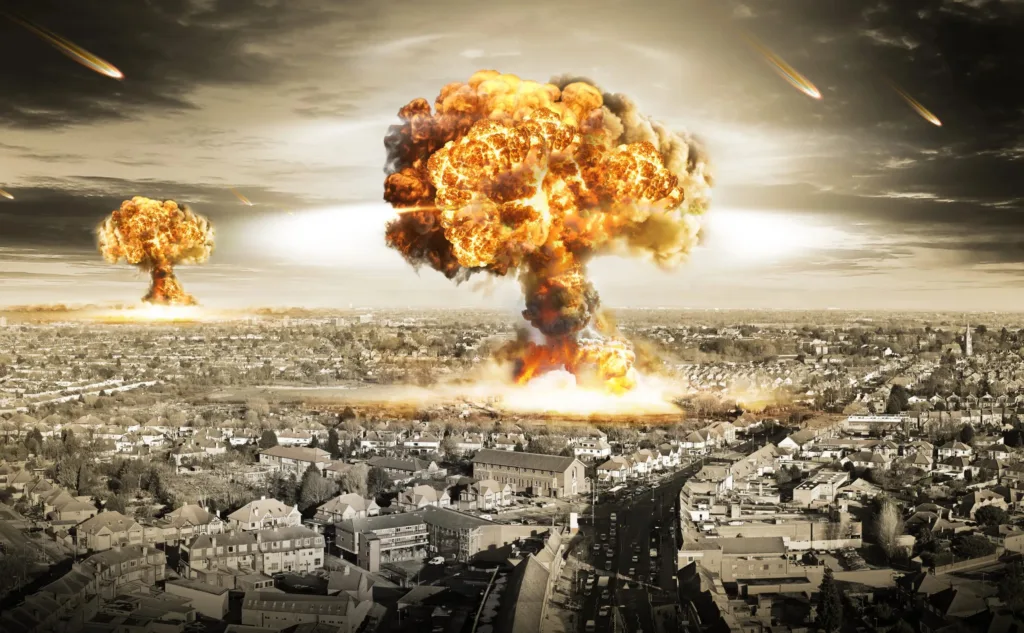The consequences of nuclear war are once again under intense global scrutiny as rising Indo-Pak tensions bring the dangers of a nuclear conflict into the spotlight. With the presence of nuclear arsenals in both countries and a history of military confrontations, the world watches closely, aware that a nuclear war would not only devastate South Asia but also trigger worldwide repercussions.
In this article, we explore the far-reaching effects of a nuclear war, from immediate destruction to long-term ecological and humanitarian crises. As debates continue at the geopolitical level, it is crucial for global citizens to understand the profound consequences of nuclear war and why its prevention must be a universal priority.
Immediate Devastation
The most immediate and visible consequence of a nuclear strike is mass destruction. When a nuclear bomb detonates, the blast radius can obliterate entire cities within seconds. Skyscrapers, hospitals, schools, and homes would collapse, and firestorms would engulf vast areas. Casualties could run into the millions, especially in densely populated cities like Delhi, Karachi, Mumbai, or Lahore.
Along with physical destruction, thermal radiation would cause third-degree burns, and nuclear fallout would begin contaminating air, water, and soil. Those within the blast radius would have little to no chance of survival, while survivors in surrounding regions would face severe injuries and long-term health complications.
Long-Term Humanitarian Crisis
One of the most tragic consequences of nuclear war is the ensuing humanitarian crisis. Hospitals would be overwhelmed or destroyed, medical supplies would be scarce, and emergency response systems would likely collapse. Refugees would flood into surrounding regions, placing immense pressure on local resources and governments.
In India and Pakistan, both developing nations with large populations, the scale of human suffering would be catastrophic. Food and clean water shortages, combined with the spread of diseases and injuries from radiation exposure, would create conditions worse than any known modern disaster.
Additionally, radiation poisoning can cause lifelong health effects such as cancer, genetic mutations, infertility, and developmental disorders in children born years after exposure. The impact on mental health, including post-traumatic stress disorder (PTSD), would also be immense and long-lasting.
Environmental and Agricultural Collapse
The aftermath of nuclear weapons includes more than human casualties; the environmental damage could be irreversible. A full-scale nuclear conflict, even if regional, could lead to what’s known as “nuclear winter.” This is a phenomenon where smoke and soot from firestorms rise into the stratosphere, blocking sunlight and causing global temperatures to plummet.
As a result, agriculture around the world would be disrupted. Crops would fail, food chains would collapse, and famine could set in even in regions not directly affected by the war. A global food crisis could result in millions more deaths in the years that follow a nuclear conflict.
Water bodies would be contaminated by radioactive fallout, affecting marine life and further limiting access to safe drinking water. Soil contamination would make farmlands unusable for generations, adding to the economic and food security problems.
Global Political and Economic Fallout
The global nuclear war impact would extend far beyond South Asia. Financial markets would crash, trade routes would be disrupted, and foreign aid systems would struggle to cope with the sudden rise in displaced populations. Neighboring countries might be pulled into the conflict or face pressures from refugee inflows and resource scarcity.
Global superpowers such as the United States, China, and Russia would be forced to respond—politically, economically, and possibly militarily. International alliances like the United Nations, NATO, and others could face severe challenges maintaining peace and humanitarian efforts.
Furthermore, the use of nuclear weapons would mark a dangerous precedent. Other nuclear-capable states might reconsider their own deterrence policies, leading to a new and more volatile era of global militarization.
Moral and Ethical Implications
Perhaps the most intangible, yet deeply significant, consequence of nuclear war is its moral cost. The use of such indiscriminate and devastating weapons violates many global ethical standards. Generations would remember it as a dark chapter in human history—a failure of diplomacy, reason, and humanity.
Public trust in governments, global institutions, and military powers would erode. Faith in peacekeeping and conflict-resolution frameworks would diminish, making future negotiations harder and further destabilizing already fragile regions.
Why Prevention is Critical
Understanding the consequences of nuclear war reinforces why it is essential for global leaders and citizens to advocate for peace and dialogue. Especially in regions with long-standing tensions like India and Pakistan, de-escalation mechanisms and diplomatic engagements are crucial.
A nuclear war has no winners—only survivors burdened by loss, destruction, and a changed world. Preventing such a catastrophe requires consistent effort from every corner of society, including media, civil organizations, international watchdogs, and informed citizens.
